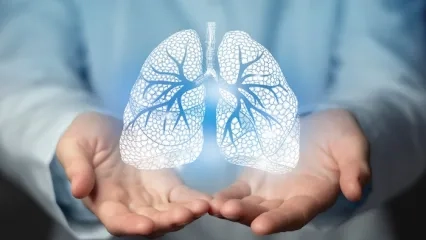Alo Yeditepe
Alo Yeditepe
Using Antipyretics Uncontrolled Can Hide Pneumonia Symptoms
Pneumonia, known as inflammation of the lungs, is still the number one cause of loss of life due to infections. Underlining that the delay in the diagnosis of pneumonia increases the risk of loss of life, Chest Diseases specialist Asst. Prof. Dr. Seha Akduman said that coughing that does not go away after viral upper respiratory tract infections, persistent resistant fever, dark expectoration, and shortness of breath may be signs of newly developing pneumonia.
Pneumonia, which ranks 6th among the causes of loss of life in the UK and the USA, ranks 5th in our country. Yeditepe University Kosuyolu Hospital Kosuyolu Hospital Chest Diseases Specialist Dr. Prof. Dr. Seha Akduman stated: “The data show that the rate of loss of life in outpatients is 1-5 percent, compared to 12 percent in hospitalized patients and 40 percent in patients requiring intensive care support.”
As The Disease Progresses, The Rate of Loss of Life Increases!
Indicating that the mortality rate from pneumonia varies between 1% and 60% depending on the severity of the disease according to studies conducted in our country, Asst. Prof. Dr. Akduman said, "The rate of severe pneumonia that should be hospitalized is significantly higher (.3-60)''.
Fever May Not be Seen in Elderly Patients!
Stating that the fever seen in pneumonia is an indicator of a struggle with microbes, Asst. Prof. Dr. Seha Akduman stated that there may be no fever response in people over 65 years of age who have weakened immunity.
“Classical findings, fever, cough, expectoration, and chest pain are the most common symptoms. However, symptoms such as shortness of breath, loss of consciousness, nausea-vomiting, frequent breathing, muscle-joint pain, and weakness may also occur in patients. However, older people need to be more careful. Because pneumonia can occur only with impaired consciousness without fever in elderly patients. "
Do Not Use Uncontrolled Antipyretic!
Drawing attention to the fact that the delay in the diagnosis of pneumonia increases the risk of loss of life, Asst. Prof. Dr. Seha Akduman said that the addition of cough, dark sputum removal, and shortness of breath, which do not go away after viral upper respiratory tract infections, may be a sign of newly developing pneumonia, especially in this period. Asst. Prof. Dr. Akduman continued as follows: “There is one point I want to draw particular attention to here. Uncontrolled use of medication or febrifugal against upper respiratory tract infections may suppress fever and symptoms. In this case, the diagnosis of pneumonia will also be delayed. Therefore, the medication should not be used without the recommendation of the doctor. It is important to rest well after viral infections, to sleep adequately and quality, and to pay attention to fluid intake and nutrition. It is also recommended to regularly use vitamins associated with the immune system, such as vitamin D. ”
People in Risk Groups should get both Pneumonia and Flu Vaccines
Reminding that especially COPD, asthma, diabetes, chronic kidney patients, cancer patients, and people receiving chemotherapy should definitely get pneumonia and flu vaccines to protect themselves, Yeditepe University Hospitals Chest Diseases Specialist Asst. Prof. Dr. Seha Akduman gave the following information about the things to be considered:
“Smoking is a very serious risk factor for pneumonia. Therefore, if the patient is using it, he/she should definitely quit or even avoid environments where s/he can be exposed to cigarette smoke in order not to be in the position of the passive smoker. Moreover, it is important for people with weakened immunity to stay away from crowded environments and to pay attention to the use of masks in terms of protection."
Press Coverage: mail | mynet | turkiye gazete | yeniakit | yenicagri | sabah | cnnturk | oncevatan
About
Faculty and Year of Graduation:
Gazi University Faculty of Medicine, 2007
”
See Also
- How to Cleanse Your Lungs?
- Is Breathing Air Dangerous in Fires?
- What is Electronic Cigarette Disease (EVALI)? EVALI Symptoms and Treatment
- What is COPD? Symptoms and Treatment of COPD
- Long Journeys Increase the Risk of Embolism!
- What Asthma and COPD Patients Should Pay Attention to When Using Air Conditioning!
- What is Allergy? What are the Symptoms of Allergy?
- What is Desert Dust? Harms of Desert Dust
- Lung Cancer Screening Age
- What is Good for Cough? How to Cure Cough?
- Lung Cancer Symptoms and Treatment
- 10 Ways to Have a Sound Sleep in the Heat
- What Should Asthma Patients Be Cautious About?
- Does Poor Quality Sleep Increase The Risk of Asthma?
- What Causes Insomnia, Diagnosis and Treatment
- 9 Common Misconceptions About COPD
- Causes, Symptoms, and Treatment of Asthma
- Allergy and Asthma During Pregnancy
- It Is Aimed to Eliminate Tuberculosis Worldwide By 2030
- Lung Patients Should Not Stop Their Medications
- 4 Significant Preliminary Symptoms of Lung Cancer
- How Does Acid Rain Affect Human Health?
- The Slowing Traffic in Istanbul Increases the Risk of Cancer!
- The American Cancer Society Has Announced; The Age of Screening For Lung Cancer Has Decreased
- Hidden Lung Cancer Cases Revealed in Tomographs Taken Due to Coronavirus
- Obesity is Both a Cause and Consequence of Sleep Apnea
- Asthma and COPD Attack Season Begins
- Lung Cancer
- Snoring and Its Treatment
Alo Yeditepe




